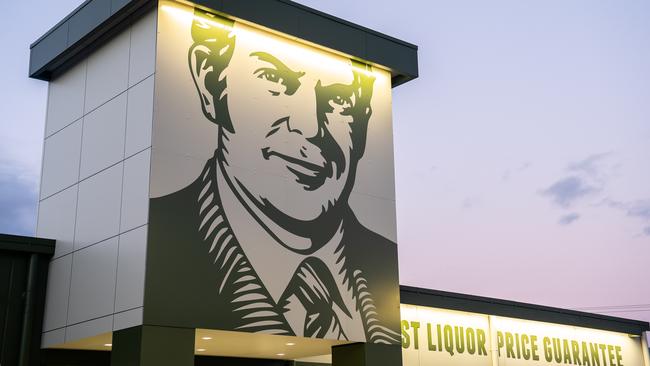Woolworths’ demerger with Endeavour Group good value for shareholders
Shareholders in Woolworths and its demerged drinks and hotels business Endeavour Group could be in line for a market-beating gain.

Shareholders in Woolworths and its demerged drinks and hotels business Endeavour Group could be in line for a market-beating gain if they hold on to both stocks when the spin off is struck, with the past 20 years of demergers in Australia generating strong outperformances.
The longer investors remain in each stock, the more likely their gains will improve.
Morgan Stanley analyst Niraj Shah has reflected on the planned multibillion-dollar demerger of Endeavour from Woolworths, slated for July 1. He said that his analysis of 23 demergers in Australia since 2000 showed that both the demerged entity and the parent have soared above the broader equities.
This outperformance was particularly evident in the first year after demerger where the median outperformance was plus 17 per cent for the demerged entity and plus 7 per cent for the parent.
“Our analysis shows that Australian demergers have typically outperformed after the demerger event, with outperformance increasing with the length of time following the demerger,” Mr Shah said.
“The potential demerger of Endeavour suggests potential outperformance and capital management, given historical precedents set in the Australian market.”
On Monday Woolworths unveiled its plans to split off its drinks and hotels arm, with shareholders to vote on the deal on June 18 and for Endeavour Group shares to begin trading on the ASX on July 1.
Shareholders will get one Endeavour share for every Woolworths share held. Woolworths and Bruce Mathieson Group (BMG), which is a joint venture partner in the hotels part of the business, would each hold a 14.6 per cent interest in Endeavour after the demerger.
“We note a dearth of direct comparables within the Australian market but believe the ex-Endeavour Woolworths business warrants a premium to the market and the Endeavour business,” Mr Shah said.
Jason Teh, chief investment officer at Vertium Asset Management, is a fan of the demerger both as an investment perspective and the fact Woolworths will be freeing itself of direct exposure to the pokies that Endeavour operates and its liquor business.
“The demerger is a good step in the right direction for Woolworths to improve its environmental, social and corporate governance (ESG) credentials,” Mr Teh said.
“It will also create value for shareholders because the sum-of-parts valuation is typically greater than the whole as the share market does not value individual business units properly — think Telstra in terms of its corporate reorganisation.”
Some analysts have concerns over the debt Endeavour will be saddled with when it emerges in July as the newest top 50 company in the ASX.
According to BAML analyst David Errington, Woolworths will tip $5bn of debt into Endeavour, which could limit its growth potential because Endeavour also needs capital expenditure to pour into updating its 12,000 poker machines and its network of pubs and hotels. The $5bn of debt is as much as 3.8 times earnings.
This could limit the capex available to invest in its businesses to about $350m so as to maintain its credit ratings.
BAML estimated that Woolworths’ net debt after the split would fall from $16.5bn to $11.5bn.
Woolworths is also pointing to up to $2bn in capital returns after the demerger is completed.
Details of the planned demerger of Endeavour Group, which could be valued as high as $15bn, were released by Woolworths on Monday including a 231-page booklet setting out the future of both companies if the split is approved by shareholders.
Endeavour, which owns the flagship Dan Murphy’s liquor chain, BWS, wine auction house Langton’s and Pinnacle Drinks beverages maker, as well as a hotels joint venture with the Mathieson family, will come to the market with sales of more than $10bn and promising a healthy dividend payout ratio of 70 to 75 per cent of net profit.
Macquarie Research in a note to clients said after the corporate split Woolworths would have a positive net cash position of $75m, down from $447m net debt.
“Given most of the group’s debt was historically within the drinks and hotels business, about $1.4bn-$1.5bn of net debt (ex-leases) will now sit with the stand-alone Endeavour business, resulting in a net cash position of $75m.
“In addition to the significantly improved balance sheet position, Woolworths will be exploring capital management options, possibly returning up to $1.6bn-$2bn back to shareholders. Hence, we believe Woolworths has now become a more attractive business.”
Macquarie said that with a total of 12,364 gaming machines, it sees potential for investment in fleet upgrades.
“Woolworths has recognised on average 11 per cent of gaming were replaced per annum with an average annual spend of $26m. This lags industry levels of 10 per cent-15 per cent renewals and we believe this presents an opportunity for Endeavour to invest in its gaming network and rejuvenate its gaming assets outside Woolworth’s more restrictive ESG settings.”






To join the conversation, please log in. Don't have an account? Register
Join the conversation, you are commenting as Logout